Nerine Dorman's Blog, page 18
October 10, 2021
Tales of Terror by Edgar Allan Poe, narrated by David Thorn, Bruce Blau
It's time for me to make yet another awful admission. I've made it past 40+ years on this planet without reading much of Edgar Allan Poe's writing. If I recall correctly, I read "The Black Cat" when I was a wee little thing, but I don't think it stuck with me. Tales of Terror by Edgar Allan Poe, narrated by David Thorn and Bruce Blau was included in my Audible subscription, so I figured why the heck not.
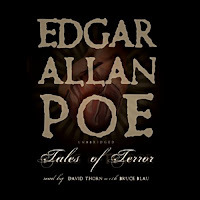
Included in this batch were the following stories: "The Tell Tale Heart", "Facts in the Case of M. Valdemar", "Hop Frog", "Murders in the Rue Morgue", "Masque of the Red Death", "The Pit and the Pendulum", "Fall of the House of Usher", "The Black Cat", and "The Cask of Amontillado".
So, in other words, all the great classics. My big takeaway from this is that Mr Poe has a bunch of favourite words, some of which include "ghastly", "grotesque" and "hideous", among many others, and he had an especial love for describing the beating of hearts of the horror of staring into eyes.
I will admit that as a cat lover, I found "The Black Cat" hard going – more so this time around than when I first read it. "Masque of the Red Death" was oddly apt for the times in which we live. Overall, I appreciated delving into these tales, as the prose is slow-moving, highly descriptive, and layered. Dark, of course, too, which is a bonus. And very much what I would term Gothic fiction.
The production quality was a bit patchy in places – I could clearly hear where extra bits were dropped in, as there was variance in the sound which jumped out at me enough for me to feel the need to comment. Some of the accents the narrators put on also grated on me a wee bit. Not enough to toss the iPhone across the kitchen, but enough to raise a brow.
If you're looking to add to your literary experiences, this is a good introduction to Poe's writing. And I can say that it very much comes alive as spoken word – to get past the author's general wordiness, that is. And he does take a while to get to a point – but then the writing is very much a product of its time, which is something to be kept in mind.
September 24, 2021
The Kingdom of Back by Marie Lu
I knew from the moment that I read the blurb that I'd enjoy The Kingdom of Back by Marie Lu. The premise is right on the mark for me: the musically gifted Nannerl Mozart wishes to be remembered, but in a world that favours men, with women relegated to being carers and mothers, a future as a shining star in music is out of reach. Not only that, but Nannerl finds herself overshadowed by her younger brother Mozart, who becomes the focus of their father's obsession for fame.
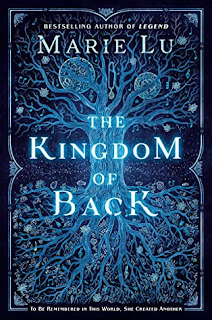
As a musician, I already knew some of Mozart's history, and I enjoyed how Lu brings Nannerl's world to life, where travel was often a wearying, toilsome process in a shaking carriage and diseases like smallpox drove fear into people's hearts. Lu's knowledge of and love for music shines through in every chapter.
At its heart, this is a story about family, and the special bond between brother and sister, but also a journey into the dream-like kingdom of Back, where the unnerving faerie Hyacinth presides. I got serious Labyrinth vibes off the novel as a whole, with Hyacinth's fair façade masking a more disturbing darkness much in the same way that Jareth the Goblin King at first presents himself as a dubious benefactor to the innocent, trusting Sarah. And in much the same way, Nannerl's own awakening as a young woman is reflected in Hyacinth as her animus.
What at first seems a magical intrusion into Nannerl's life soon takes a more sinister turn, as she navigates the choppy waters of growing up and finding her place in the world, while also coming to grips with the bargain she's struck with Hyacinth. I won't spoil, but I will say this much: the ending was bittersweet and subtle, and the author's message about women's rights crystal clear. How many other young women throughout the ages have had to take a back seat due to societal norms? This resonated strongly with me.
Lu's writing is as musical as her subject matter, and her descriptions bring the story vividly to life. There were parts of the tale that dragged a little, and the conclusion is more a gradual, somewhat predictable unfolding as Nannerl aims to set injustices right, but overall this is a thoroughly enchanting story that I'd recommend to anyone who cares about the dreams of young women.
September 18, 2021
A Blessing of Unicorns by Elizabeth Bear
I've been meaning to get into Elizabeth Bear's writing for a while now, so when A Blessing of Unicorns popped up in my Audible suggestions, I thought why the hell not. Only in hindsight do I see it's book 2 of a sequence of stories – The Sub-Inspector Ferron Mysteries, but it didn't bother me none that I missed the first instalment, and I may well go back to pick it up when I have a moment.
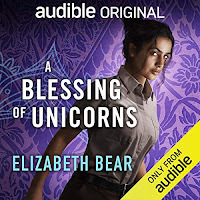
I will admit that it took a little getting used to narrator Zehra Jane Naqvi's voice, perhaps because the previous audiobook I'd listened to had been read by a man with a much deeper voice, but once I was over the initial shift, I got into Naqvi's style.
Set in the 2070s, which aren't that much different than current times, save for the deeper reliance on virtual and augmented reality than we have currently, A Blessing of Unicorns has Bangalore-based Police Sub-Inspector Ferron trying to figure out why internet-famous influencers are going missing. Not to mention figuring out why the missing women's flats are filled with small herds of artificial lifeforms in the form of multi-coloured unicorns.
Overall, this is a somewhat playful mystery that pokes sticks at society's tendency to put internet-famous influencers and their rather artificial lives on a pedestal. I enjoyed it, especially for the non-Western-centric flavour in speculating on an India of the future. And Ferron is a delight, and a pleasing change from the usual jaded, hard-bitten cops that often crop up in these sorts of stories.
September 6, 2021
Frankenstein by Mary Shelley
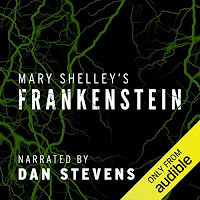
Hint: It's not the creature.
At least, that's not how I see it.
What makes Frankenstein or, as it's also known, The Modern Prometheus, even more amazing is that Shelley started writing it at the tender age of 18, and it was published when she was 20, in 1818. How many of us can boast such a feat? Hells, I only finished my first novel after I turned 30. And it certainly wasn't even a touch near the mastery that Shelley boasts.
Frankenstein is a classic example of a Gothic novel, and I'd hazard to argue that it firmly straddles both the science-fiction and horror genres, and if you're serious about writing SFF, it's one of those works that is an absolute must to have delved into if you consider yourself an author who has earned their chops.
I haven't had as much time as I'd have liked to sit down and read the novel, but was able to pick up a copy included in my Audible subscription – a win. So I'd like to give a massive shout-out to the narrator, Dan Stevens, who did an absolutely amazing job with his characterisation of not only Victor Frankenstein, but the creature, and also Captain Walton, all of whom are important narrators.
Each has a particular viewpoint of the situation as unreliable narrators of the story: Frankenstein in his hubris and denial in his role as creator; the creature in his failed quest for personhood; and Walton as an impartial observer who introduces and ties up the story.
There's much more to this story than merely a mad scientist playing god – if you delve deeper, it's a look at what makes us truly human, the capacity to reason, to feel pain. On a meta-level, it can even be viewed as a story that shakes its fist at an uncaring, unfeeling and selfish god who creates without care for his creations. And, also, a cautionary tale of not taking anyone or any situation at face value – with far-reaching consequences.
I kept asking myself: what if Victor had not recoiled in horror? How different would this story have been? Instead, I found myself growing increasingly angry with the man in his hubris and denial in his role for having created this monster. Yes, yes, there'd have been no story otherwise, but I couldn't help but feel for the wretched monster so desperate to find love and acceptance.
If you, like me, have yet to give this story a spin in its original format, but don't have the time to read, then I wholeheartedly recommend this edition from Audible. It's incredibly well produced and Shelley's writing is nothing short of magnificent.
August 22, 2021
God of Vengeance (The Rise of Sigurd #1) by Giles Kristian
I've been meaning to get back into Giles Kristian's writing for a long, long time, and picked up God of Vengeance (The Rise of Sigurd #1) when it was on sale not so long ago. Perhaps it's because I've really enjoyed The Last Kingdom as well as the source material (Bernard Cornwell's books), and just a general fuzz for anything Viking Age related – so God of Vengeance really just pushes all the right buttons for me currently.
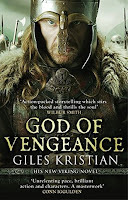
First off, Kristian writes combat sequences well, and with a ring of authenticity that is hard to find in the historical fiction or even epic fantasy genres. He really makes you feel like you're present, as a reader, and the cast of characters he brings to life is diverse and complex.
We start the journey with young Sigurd, son of the jarl Harald. And the worst happens to a young man – his entire family is killed in a plot by a crooked king, and unsurprisingly, our enterprising lad vows vengeance. The only problem is he's got no boat, no resources, and no warband – to go up against a bunch of back-stabbing wolves who hold all the power. And not only that, they've taken his sister, Runa, to be married against her will to a man she doesn't love.
So, yeah, Sigurd's got a huge axe to grind, and this story is all about how he gets his stuff together, against all odds, to rescue Runa and spill his enemies' blood. And a lot of warning: so. Much. Blood. Kristian also skirts around the edges in terms of the supernatural. We never know if the gods are real or whether Odin really does favour Sigurd, but enough happens to show how the gods' actions are all too real to their believers. While Sigurd claims to be favoured by Odin, a boast that will make most god-fearing folks reconsider whether they want to cross him, we must remember that Odin is not exactly a kind nor gentle god, and for all victories claimed in Odin's name, a terrible blood price must be paid.
This action-packed revenge-epic is just right. Now excuse me while I toddle off to pick up book 2.
August 2, 2021
Peacocks & Picathartes – Reflections on Africa's Birdlife by Rupert Watson
When I was 12, most kids my age were into ... well, whatever it was that they were into. Me, on the other hand, I was into birdwatching. Armed with a brand-spanking new copy of the Roberts Birds of Southern Africa, I set about figuring out the names of the birds around me. It was something of an obsession. And while today I have the trusty Sasol eBirds of Southern Africa app, not much has changed. Friends and family still look at me like I'm a little sad and strange when I interrupt the discussion to go, "Oh, look, a Southern Boubou."
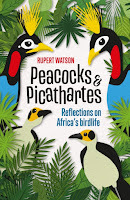
So it goes without saying that I was overjoyed when Rupert Watson's Peacocks & Picathartes: Reflections on Africa's Birdlife arrived on my doorstep. Although he was born in England, Watson has lived in Kenya for a large portion of his life, and his love for, nay fascination with, our beautiful continent's birdlife shines through in every word. I must also give a shout out to illustrator Peter Blackwell, whose characterful graphite drawings of various birds are used as chapter headers, and add much joy to the book.
There is no denying how special Africa and its natural heritage is, and there are many species found here and nowhere else. Climate change and the impact of human activities on the environment, be it encroaching agriculture, urbanisation, and forestry – these all are massive threats to our natural biodiversity. By highlighting birds, their habitats and distribution, Watson reminds us of the fragile balance in nature.
Watson maintains a factual account of the birds' habits and characteristics, peppered with often amusing anecdotes of his own adventures in seeing some of the rarer species, particularly the occasions he sought out the Congo Peacocks and Picathartes that lend their names to the book's title. He divides the book into sections that focus on birds that are found only in Africa, those that are mainly in Africa, and then six species that are iconic, such as the Egyptian Goose many of us love to hate; the Udzungwa Forest Partridge; the Congo Peacock; the Bateleur; and not to be outdone, the Hadada Ibis whose raucous calls many of us know all too well at 5am on a Sunday when we'd rather be sleeping in.
If birdwatching and conservation are your passions, then don't miss out on this book.
July 26, 2021
Authentically Mexican by John Paul Brammer
In the spirit of mixing things up, I downloaded Authentically Mexican by John Paul Brammer, which was included in my Audible subscription. It's not a long audiobook, but in terms of it being vastly different from the cultural slant I'm accustomed to, it nevertheless offered a slice of novelty for me.

I admit that I struggled a bit with the narration – Brammer reads his own work, and he has a particular upward inflection that annoys me. So it took me a bit to get into the audiobook. What I did love was his discussion of identity – something I do relate to a lot. Brammer stands in a cultural no-man's land somewhere between his Mexican and American heritage, and most of the book is about how he tries to bridge that gap and find an identity that is uniquely his own – by digging into his Mexican roots through food.
His family is anything but standard, but what shines through is Brammer's love for his grandmother and the recipes that underpinned his world. This book is part discussion on food, family, cultural heritage, and identity, and how all are inextricably linked. Joy, sorrow, and nostalgia mingle in a way that you can almost taste and touch the meals discussed. As a South African, the chances of me ever getting to eat any of the foods mentioned here, as cooked authentically across the pond, are slim, but I do feel like I've stepped away from this reading with a better understanding of the complexities of a culture that is vastly different from my own yet has some universalities that transcend culture geographic separation.
July 20, 2021
Caesar's Legion by Stephen Dando-Collins
For many years, Julius Caesar was a cartoon character for me – I admit that I learnt to read by paging through dog-eared copies of Asterix and Obelix comics. But of late, in my increased delving into history, my fascination with the Roman empire has grown, perhaps because some of the juicier bits involve Egypt. Also, as an author of fantasy fiction, I'm a huge believer in gaining an understanding of things of a more military persuasion. Caesar's Legion by Stephen Dando-Collins, which is well narrated by Stuart Langton, certainly gave me a much deeper understanding of the Roman legions, and also the machinations of the empire itself.
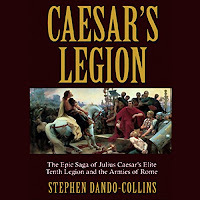
Although the work focuses most on the doings of the renowned Spanish Tenth Legion, we get a broader picture of the Roman military in general, as well as the conflicts from within and without the empire. Love him or hate him, Julius Caesar really was a force to be reckoned with – and there's a reason why he's been immortalised in our cultural objects. While Dando-Collins does enact some dramatic license in this work, he nevertheless leans heavily on existing primary sources – so if you're looking for a meaty engagement with the topic, this is pretty darned good, giving everything from how the legions ordered their camps all the way to the many campaigns the legions were engaged in.
Empire building is a tricky business, as we discover. There are the struggles at the beginning, the glory days, and then the inevitable slow winding down. While it can be argued that imperial powers do a lot of damage to the smaller cultures they assimilate, empires also build something that is bigger than the sum of all their parts – and we still see echoes of Rome in contemporary Western culture to this day. Caesar's Legion is an incredibly useful resource to anyone fascinated by this culture, and if I ever do lay hands on a printed copy, it will be part of my permanent collection. If you're a history buff like me, or simply someone curious to learn more, this is an excellent resource.
July 4, 2021
Origins: The Search for Our Prehistoric Past by Frank HT Rhodes
I was one of those kids who grew up watching way too many National Geographic documentaries at a child, so every once in a while I still love to indulge in content that will not only prove to challenge me, but also broaden my understanding of the natural world. Origins: The Search for Our Prehistoric Past by Frank HT Rhodes, narrated by Derek Perkins, is one such title that, as the the name suggests, digs deep into the origins of life on our planet.

This is an ambitious work, and the periods it covers is vast, but what I really appreciate about it is that it really put into perspective our position as a species when viewing the vast history of life on Earth. Truth be told, our existence as member of the family of great apes is a mere addendum when all is considered. In evolutionary terms, mammals are pretty much latecomers on the planet.
Rhodes not only delves into the history of life on earth, and all the multiple theories and hypotheses lying at the root of our understanding, but he also tells the story of the very early geologists and palaeontologists whose life works contributed to the theories that are currently accepted by the majority of scientists this day. Great care is taken into explaining how the theory of evolution functions, as well as how the taxonomy of living things is executed. It doesn't matter if you know next to nothing or, like me, are an armchair enthusiast – you'll get a wonderful broad overview that acts as a springboard for further study.
To be fair, this is such an enormous topic to cover, but I do think Rhodes does admirably well to paint in broad strokes – especially when it comes to explaining how evolution works. What I appreciated also was the way in which he touched on the reality of extinction, examining the mass extinction-level events or circumstances of the past, as well as reminding readers of the essential ephemeral and somewhat tenuous nature of life.
The only downside to listening to the audiobook is that you don't have ready access to any of the accompanying diagrams or illustrations that you'd find in the printed book, but you can download a handy reference guide as a PDF from the Audible website if you're of a mind to delve deeper.
June 29, 2021
The King Must Fall – in conversation with Adrian Collins
I'm a huge fan of Grimdark Magazine. They bring out a lot of awesome material, so it goes without saying that I sat up and noticed with editor Adrian Collins told me about his project, The King Must Fall, which has a stellar ensemble – go check out the Kickstarter page when you have a moment. I can't wait to read the anthology when it's out. In the meanwhile, Adrian has stopped by my blog for a quick Q&A...
Nerine Dorman (ND): Was there a particular creative brief that you put together for the authors for The King Must Fall?
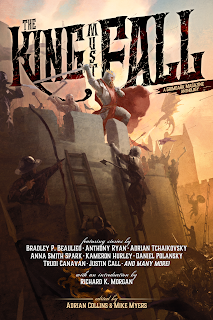
Adrian Collins (AC): Definitely. For The King Must Fall I asked each author to write a story about a king or authority figure being deposed. I didn’t specify if they had to be simply removed, or killed, or if the attempt even needed to be successful – I can’t wait to see what they all come up with.
However, I think the most interesting part of this story is that the theme wasn’t my idea. I was trying to think of how to follow up Evil is a Matter of Perspective and just wasn’t having anything cool coming to mind. Out of the blue I received an email from Bradley P Beaulieu telling me about an idea he’d had for an anthology, but just didn’t have the time to drive – and because I love stuff like this, The King Must Fall was born!
ND: That's quite the stellar cast you've got going for your contributors. Which are the stories you’re most looking forward to?
AC: That’s a hard one to pick. Just because I haven’t published them before, I’m really looking forward to seeing Daniel Polansky and Kameron Hurley’s short stories.
ND: Did you think that certain themes will come through – I find this fascinating as an editor of anthologies myself, that there are often ideas that echo in the submissions – as if they have inadvertently drawn from the same well.
AC: I’m with you! One of the things I love most about building and reading anthologies is seeing how each creator puts their own angle or spin on the theme. Sometimes there will be similarities, and sometimes an idea completely out of left field will blow you away.
For The King Must Fall I’ve received four first drafts, and a few of the other authors have sent through their ideas on what their stories will be, so I’m feeling really confident that they will all be thematically on point. And based on the authors we have, I know they are going to be dark AF and diverse in delivery.
ND: What have you, as editor, enjoyed the most about putting together the anthology?
AC: I actually love the process of it. Pulling together all of the authors by leveraging years of author and artist relationships, speaking with printers and distributors and shipping companies, deciding how it’s going to look, planning out the financial requirements, timeframes, etc – all of the tiny pieces of a publishing project that eventually turn into a book. This is the stuff that I love doing. We already have stories coming in, and I’m loving reading them. I can’t wait to show the final product to our customers.
ND: Congratulations for funding this via Kickstarter – what, in your opinion, makes a Kickstarter campaign so successful?
AC: In short, a clean, clear product that’s marketed really well makes a successful Kickstarter. Compelling content, an engaging video, rewards that can be grown upon through stretch goals, and consistent market engagement through advertising.
There’s also so many things that can go wrong during a process that’s often 6-9 months long. I’ve listed five key learnings from the three Kickstarters I’ve run over on Booknest.eu.
ND: Things in the industry have been, well, weird of late. What are some of your tips and tricks for keeping your publishing endeavours alive?
AC: GdM has experienced a pretty solid period of growth throughout the pandemic, to be honest. Key to where we are at the moment has really come down to a key structure change we implemented about 18 months ago: we split GdM into two arms – the publishing side, and the online content team – and got the right people in place to drive both.
The online content focus drives web traffic to our site and products. It’s created additional and improved revenue streams and grown our brand in the market, which has helped us thrive.
Other than that, the article I wrote for Fantasy Hive, called Starting and Running an Ezine in a few Simple, Soul-destroying Steps covers it in the further detail.
ND: In the stories that you publish in GdM, what are the elements that you are looking for specifically? What makes you perk up when you read a submission?
AC: I’ve been looking for and finding the same thing for seven years: a grim story told in a dark world by a morally grey protagonist. Authors will blow me away with an anti-hero story that matters. A perspective that perhaps makes me recoil at first, and makes me want to engage more by the end. There doesn’t have to be a single drop of blood, but you need to show me grey morality.
And I can’t reiterate that enough: blood, guts, and sexual violence do not a grimdark story make (especially that last one, just leave it out please). It’s the anti-hero and the grey morality that win me over.
ND: Who are three up-and-coming voices in the grimdark genre you believe people should pay attention to?
AC: This is actually a hard question for me to answer. Before GdM I used to have time to read 50-60 books a year. Now I’m lucky if I get through ten. I’ve fallen behind the times on new authors I’m afraid!
I will say that P Djèlí Clark, RF.Kuang, and Anna Smith Spark are three authors where I can’t wait to see what they release next.
ND: What do you love about grimdark fiction?
AC: I love that it feels more human. It feels like a story with somebody I know at the helm – like actual people and not indestructible superheroes are involved. I can relate to these characters because I can be and have been a screw up, and grimdark heroes are generally just bigger screw-ups trying to do better, but screwing up more.
More about Adrian...

Adrian Collins runs Grimdark Magazine and loves anything to do with telling darker stories. Doesn't matter the format, or when it was published or produced – just give him a grim story told in a dark world by a morally grey protagonist and this bloke's in his happy place. Add in a barrel aged stout to sip on after a cheeky body surf under the Australian sun, and that's his heaven.
Adrian and his team are currently working on The King Must Fall through Kickstarter.



